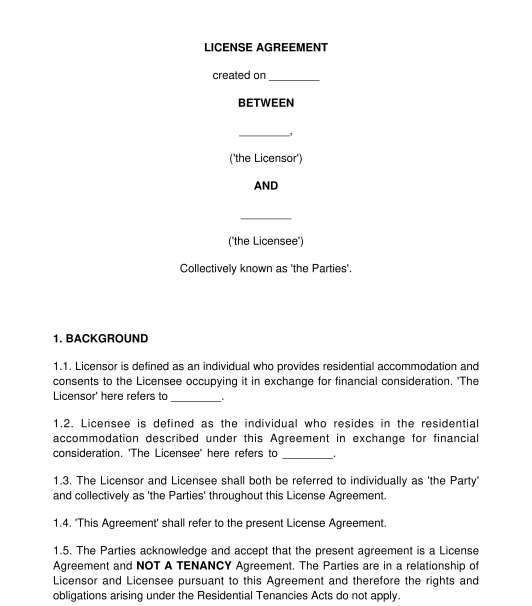 24/10/2025
24/10/2025

Answer a few questions and your document is created automatically.

Your document is ready! You will receive it in Word and PDF formats. You will be able to modify it.

 24/10/2025
24/10/2025
 Word and PDF
Word and PDF
 6 to 10 pages
6 to 10 pages
This Licence Agreement (the 'Agreement') is a contract whereby one party (the Licensor) formally grants their consent for another party (the Licensee) to occupy their property in exchange for a fee.
In this Agreement, the Licensor and Licensee are both individuals and not legal entities.
A Licensor is typically the owner of the property but can also be a tenant under a lease agreement. The Licensee is the individual who pays for the right to use the property. Pivotally, the Licensee's right to use the property is non-exclusive and subject to the Licensor's ongoing consent.
The difference between the Residential Lease Agreement and this License Agreement
It is important at the outset to understand the difference between a lease and a licence. While both provide for individuals to rent out accommodation, legally they are very different and attract different rights and obligations for renters.
* A lease grants the renter (the tenant) exclusive use and possession of the property. The tenant controls the property and has an enforceable legal interest therein. The owner of such a property (landlord) is not entitled to enter the property without the Licensee's consent.
* A license grants the renter (the licensee) the right to perform a particular activity on the property (i.e. reside there). This right is not exclusive and subject to conditions. Others can use and act on the property contemporaneously. The Licensee may only be permitted to use the property on certain days or occupy certain spaces therein. The control of the property remains with the Licensor and the Licensee has no legal interest in the property.
Leases are subject to Landlord and Tenant law and governed by the Residential Tenancies Act. A tenant under a lease has many rights in respect of security of tenure and the landlord many obligations in respect of maintenance of the property.
Licenses are not subject to the Residential Tenancies Act and the rights that apply to tenants do not apply to licensees. A licence agreement is the ideal legal mechanism to accommodate situations wherein the renter does not need to use the property every single day of the week (for example, students or workers going home on weekends) and where exclusive possession is not necessary or ideal (for example, younger people wanting to rent a room in a family home) or where the Licensee needs to secure accommodation for a short period of time. Furthermore, given the restrictions imposed on the Licensee, renting accommodation under a license agreement is typically cheaper than acquiring a lease.
This document contains all the core terms necessary to effectuate a robust licence agreement. It sets out:
This document should ideally be filled out by both the Licensor and Licensee so that both Parties are on the same page.
The document should be filled out accurately using the form provided, then dated, printed and signed by the Licensor and Licensee. Both Parties should retain a hard copy of the document as a point of reference throughout there relationship and as evidence in the event of any future dispute.
This agreement would ideally suit the following situations:
This document is written in compliance with Irish Land Law and Irish Contract Law.
You fill out a form. The document is created before your eyes as you respond to the questions.
At the end, you receive it in Word and PDF formats. You can modify it and reuse it.
License Agreement - sample template - Word and PDF
Country: Ireland